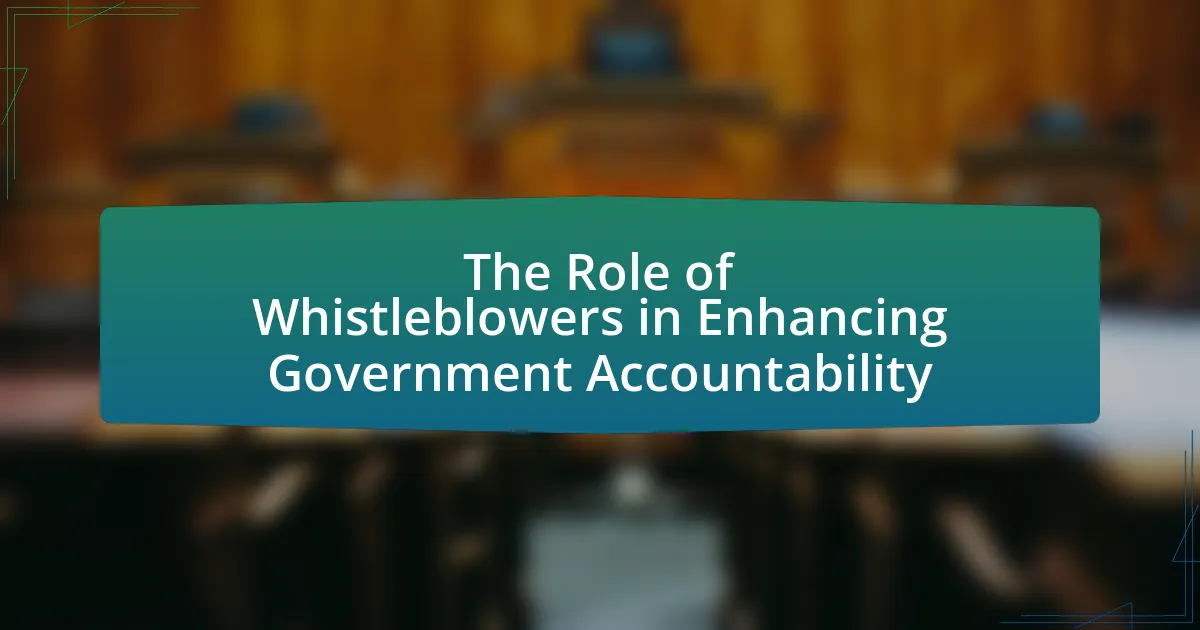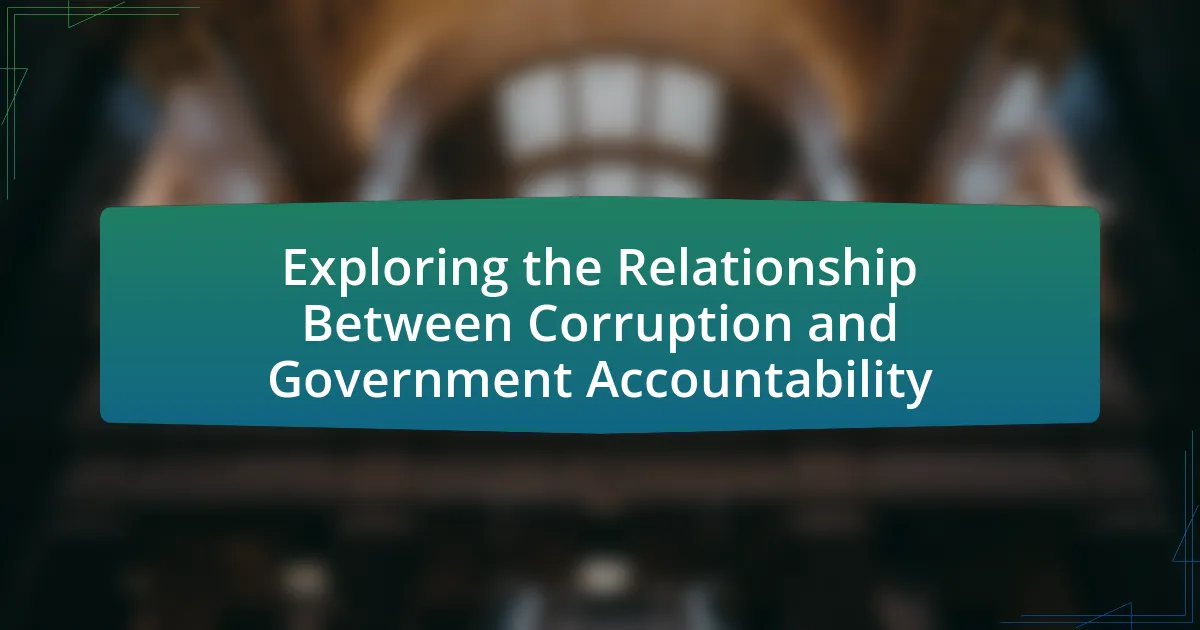Citizen engagement is a critical factor in enhancing accountability within local governments. The article explores how active participation from citizens fosters transparency, improves governance, and holds local officials accountable for their actions. Key components of citizen engagement, such as communication, collaboration, and feedback mechanisms, are examined, along with various forms of engagement like public consultations and participatory budgeting. The role of technology in facilitating these interactions is highlighted, as well as the importance of accountability in building public trust. Additionally, the article addresses challenges to citizen engagement and offers best practices for local governments to improve participation and responsiveness, ultimately leading to better governance outcomes.

How does citizen engagement influence accountability in local governments?
Citizen engagement significantly enhances accountability in local governments by fostering transparency and encouraging active participation in decision-making processes. When citizens are involved, they hold local officials accountable for their actions and policies, leading to improved governance. Research indicates that municipalities with higher levels of citizen engagement report better accountability outcomes, as citizens can voice concerns, provide feedback, and demand explanations for government actions. For instance, a study by the International City/County Management Association found that local governments that implemented citizen engagement strategies saw a 30% increase in public trust and accountability measures. This demonstrates that active citizen participation is crucial for ensuring that local governments remain answerable to the communities they serve.
What are the key components of citizen engagement?
The key components of citizen engagement include communication, participation, collaboration, and feedback. Communication ensures that citizens are informed about government actions and policies, fostering transparency. Participation involves citizens actively taking part in decision-making processes, which enhances democratic governance. Collaboration refers to partnerships between citizens and government entities, allowing for shared responsibility in addressing community issues. Feedback mechanisms enable citizens to express their opinions and concerns, ensuring that their voices are heard and considered in policy formulation. These components collectively enhance accountability in local governments by promoting a responsive and inclusive governance framework.
How do different forms of citizen engagement manifest in local governance?
Different forms of citizen engagement manifest in local governance through mechanisms such as public consultations, participatory budgeting, and community advisory boards. Public consultations allow citizens to voice their opinions on local policies and initiatives, fostering transparency and responsiveness from local officials. Participatory budgeting enables residents to directly influence budget allocations, enhancing accountability by ensuring that funds are spent according to community priorities. Community advisory boards provide a structured way for citizens to collaborate with local government, facilitating ongoing dialogue and feedback. These engagement methods have been shown to improve trust in local governance, as evidenced by studies indicating that municipalities with higher levels of citizen participation report greater satisfaction with government performance.
What role does technology play in facilitating citizen engagement?
Technology plays a crucial role in facilitating citizen engagement by providing platforms for communication, information sharing, and participation in governance. Digital tools such as social media, mobile applications, and online forums enable citizens to voice their opinions, access government services, and participate in decision-making processes. For instance, a study by the Pew Research Center found that 69% of adults in the U.S. use social media, which serves as a significant channel for civic engagement and mobilization. Additionally, platforms like e-petitions and participatory budgeting software allow citizens to directly influence local government decisions, enhancing transparency and accountability.
Why is accountability important in local governments?
Accountability is crucial in local governments because it ensures that elected officials and public servants are answerable for their actions and decisions. This transparency fosters trust between the government and its citizens, leading to increased civic engagement and participation. Studies show that when local governments are accountable, they are more likely to allocate resources effectively and respond to community needs, ultimately enhancing public service delivery and governance. For instance, a report by the International City/County Management Association highlights that accountability mechanisms, such as public reporting and citizen feedback, significantly improve local government performance and citizen satisfaction.
What are the consequences of a lack of accountability in local governance?
A lack of accountability in local governance leads to corruption, inefficiency, and a decline in public trust. When local officials are not held accountable for their actions, they may engage in corrupt practices, such as misappropriating funds or favoring certain groups, which undermines the integrity of governance. Research indicates that communities with low accountability experience higher levels of inefficiency in public service delivery, as resources are often mismanaged or wasted. Furthermore, the absence of accountability erodes public trust, making citizens less likely to engage with local governance processes, which can perpetuate a cycle of disengagement and further diminish accountability.
How does accountability impact public trust in local governments?
Accountability significantly enhances public trust in local governments by ensuring transparency and responsibility in decision-making processes. When local governments are held accountable for their actions, citizens perceive them as more reliable and trustworthy, leading to increased civic engagement and participation. Research indicates that communities with higher levels of accountability experience greater public satisfaction and confidence in their local officials. For instance, a study by the International City/County Management Association found that 70% of residents in accountable local governments reported feeling more connected to their community. This correlation underscores the importance of accountability in fostering a trusting relationship between local governments and their constituents.
How can citizen engagement enhance accountability?
Citizen engagement enhances accountability by fostering transparency and enabling citizens to hold local governments responsible for their actions. When citizens actively participate in decision-making processes, they can demand clarity on government operations and expenditures, which leads to increased scrutiny of public officials. For instance, studies show that communities with higher levels of citizen involvement in governance report better performance in public service delivery and reduced corruption. This correlation is evident in initiatives like participatory budgeting, where citizens directly influence budget allocations, resulting in more responsible fiscal management and greater public trust in government.
What mechanisms allow citizens to hold local governments accountable?
Citizens can hold local governments accountable through mechanisms such as public hearings, citizen advisory boards, and transparency initiatives. Public hearings allow citizens to voice concerns and influence decision-making processes, ensuring that local officials consider community input. Citizen advisory boards provide a structured way for residents to participate in governance, offering recommendations and feedback on local policies. Transparency initiatives, including open data platforms and accessible government records, empower citizens by providing them with the information needed to scrutinize government actions and expenditures. These mechanisms collectively enhance civic engagement and promote accountability in local governance.
How does citizen feedback influence decision-making processes?
Citizen feedback significantly influences decision-making processes by providing local governments with insights into community needs and preferences. This feedback allows decision-makers to align policies and services with the expectations of constituents, thereby enhancing the relevance and effectiveness of governance. For instance, studies have shown that municipalities that actively solicit and incorporate citizen input tend to experience higher levels of public satisfaction and trust. Research conducted by the International City/County Management Association indicates that local governments that engage citizens in decision-making processes can improve service delivery and foster greater accountability.
What challenges exist in fostering citizen engagement for accountability?
Fostering citizen engagement for accountability faces several challenges, including lack of trust in government, limited access to information, and socio-economic barriers. Lack of trust undermines citizens’ willingness to participate, as evidenced by surveys indicating that only 27% of Americans trust their government to do what is right (Pew Research Center, 2021). Limited access to information restricts citizens’ ability to engage meaningfully, with studies showing that 40% of citizens feel uninformed about local government activities (National Civic League, 2020). Socio-economic barriers, such as poverty and education disparities, further inhibit participation, as individuals from lower socio-economic backgrounds often lack the resources or time to engage in civic activities. These challenges collectively hinder effective citizen engagement, which is crucial for ensuring accountability in local governments.
What barriers do citizens face in participating in local governance?
Citizens face several barriers in participating in local governance, including lack of awareness, limited access to information, and socio-economic constraints. Lack of awareness often stems from insufficient outreach and education about governance processes, which can lead to disengagement. Limited access to information can occur due to inadequate communication from local authorities, making it difficult for citizens to understand issues or participate effectively. Socio-economic constraints, such as time limitations due to work commitments or financial barriers, can further hinder participation. According to a study by the National Civic League, these barriers significantly impact citizen engagement, highlighting the need for improved communication and support systems to foster greater involvement in local governance.
How can local governments overcome these challenges?
Local governments can overcome challenges by implementing effective citizen engagement strategies that enhance transparency and accountability. By actively involving citizens in decision-making processes, local governments can gather valuable feedback, which helps to identify community needs and priorities. For instance, studies show that municipalities that utilize participatory budgeting see increased public trust and satisfaction, as citizens feel their voices are heard and valued. Additionally, leveraging technology, such as online platforms for public consultations, can facilitate broader participation and streamline communication between government officials and residents. This approach not only fosters a sense of ownership among citizens but also leads to more informed and responsive governance.
What best practices can local governments adopt to improve citizen engagement?
Local governments can improve citizen engagement by implementing transparent communication strategies, utilizing technology for outreach, and fostering community participation in decision-making processes. Transparent communication, such as regular updates on local issues and initiatives, builds trust and keeps citizens informed. For instance, cities that publish open data reports have seen increased public involvement, as citizens can better understand local governance. Utilizing technology, such as social media platforms and mobile applications, allows local governments to reach a broader audience and facilitate two-way communication. Additionally, engaging citizens through public forums, surveys, and participatory budgeting encourages active involvement in local governance, leading to more responsive and accountable government actions. Research shows that municipalities that adopt these practices experience higher levels of citizen satisfaction and trust in government.
How can local governments effectively communicate with citizens?
Local governments can effectively communicate with citizens by utilizing multiple channels such as social media, community meetings, and newsletters. These methods allow for direct engagement and timely dissemination of information, fostering transparency and trust. For instance, a study by the International City/County Management Association found that 70% of local governments use social media to enhance communication, which has been shown to increase citizen participation in local governance. Additionally, regular community meetings provide a platform for citizens to voice concerns and ask questions, further strengthening the relationship between local authorities and the community.
What strategies can be implemented to encourage active citizen participation?
To encourage active citizen participation, local governments can implement strategies such as creating inclusive forums for dialogue, utilizing technology for engagement, and providing education on civic responsibilities. Inclusive forums, such as town hall meetings, allow citizens to voice their opinions and contribute to decision-making processes, fostering a sense of community ownership. Technology, including social media platforms and mobile applications, can facilitate real-time communication and feedback, making participation more accessible. Additionally, educational programs that inform citizens about their rights and the importance of their involvement can empower them to engage actively. Research indicates that communities with higher levels of civic education see increased participation rates, demonstrating the effectiveness of these strategies in enhancing citizen engagement and accountability in local governance.
How can citizen engagement be measured in terms of accountability outcomes?
Citizen engagement can be measured in terms of accountability outcomes through various quantitative and qualitative metrics, such as participation rates in public consultations, feedback mechanisms, and the implementation of citizen-initiated projects. For instance, a study by the World Bank found that increased citizen participation in local governance correlates with improved service delivery and transparency, indicating a direct link between engagement and accountability. Additionally, surveys assessing citizen satisfaction with government responsiveness and the effectiveness of public services provide concrete data on accountability outcomes, demonstrating how engaged citizens can influence government actions and policies.
What metrics can be used to assess the effectiveness of citizen engagement initiatives?
Metrics used to assess the effectiveness of citizen engagement initiatives include participation rates, feedback quality, and outcome impact. Participation rates measure the number of citizens involved in initiatives, indicating the level of interest and engagement. Feedback quality assesses the depth and relevance of citizen input, which reflects the initiative’s ability to capture diverse perspectives. Outcome impact evaluates the tangible changes resulting from citizen engagement, such as policy adjustments or improved services, demonstrating the initiative’s effectiveness in influencing local governance. These metrics provide a comprehensive framework for evaluating how well citizen engagement initiatives fulfill their objectives and enhance accountability in local governments.
How can local governments evaluate the impact of citizen feedback on accountability?
Local governments can evaluate the impact of citizen feedback on accountability by implementing systematic feedback mechanisms, such as surveys and public forums, to gather data on citizen perceptions and experiences. These mechanisms allow local governments to quantify the feedback received and analyze trends over time, which can be compared against accountability metrics like service delivery performance and responsiveness to citizen concerns. For instance, a study by the World Bank found that municipalities that actively solicited and acted on citizen feedback saw a 20% increase in public satisfaction and trust in local governance. This demonstrates that structured evaluation of citizen feedback can lead to measurable improvements in accountability.
What are the future trends in citizen engagement and accountability in local governments?
Future trends in citizen engagement and accountability in local governments include increased use of digital platforms, enhanced participatory budgeting, and greater emphasis on transparency through data accessibility. Digital platforms, such as mobile applications and social media, facilitate real-time communication between citizens and local officials, allowing for immediate feedback and engagement. Participatory budgeting initiatives empower citizens to directly influence budgetary decisions, fostering a sense of ownership and responsibility. Additionally, local governments are prioritizing transparency by making data publicly available, which enhances accountability and enables citizens to monitor government actions effectively. These trends are supported by studies indicating that increased transparency and citizen involvement lead to improved trust in local governance and better public service outcomes.
How might technology reshape citizen engagement in the coming years?
Technology will significantly reshape citizen engagement in the coming years by enhancing communication, increasing accessibility, and facilitating real-time feedback. Digital platforms, such as social media and mobile applications, will allow citizens to interact with local governments more efficiently, fostering transparency and participation. For instance, a study by the Pew Research Center found that 70% of Americans use social media to engage with local issues, indicating a shift towards digital engagement. Additionally, tools like online surveys and participatory budgeting platforms will enable citizens to voice their opinions and influence decision-making processes directly, thereby increasing accountability in local governance.
What role will social movements play in enhancing accountability?
Social movements play a crucial role in enhancing accountability by mobilizing citizens to demand transparency and responsiveness from local governments. These movements often raise awareness about issues such as corruption, inequality, and policy failures, thereby pressuring officials to act in the public interest. For instance, the Black Lives Matter movement has significantly influenced police accountability measures in various cities, leading to policy reforms and increased scrutiny of law enforcement practices. By organizing protests, utilizing social media, and engaging in advocacy, social movements create a platform for collective action that holds local governments accountable to their constituents.
What practical steps can citizens take to engage with their local governments effectively?
Citizens can engage with their local governments effectively by attending public meetings, participating in community forums, and utilizing online platforms for feedback. Attending public meetings allows citizens to voice their concerns and ask questions directly to elected officials, fostering transparency. Community forums provide a space for dialogue between citizens and government representatives, enhancing mutual understanding. Additionally, many local governments offer online platforms where citizens can submit comments or participate in surveys, making it easier to share opinions and influence decision-making. Research indicates that active citizen participation leads to improved accountability and responsiveness from local governments, as seen in studies conducted by the International City/County Management Association, which highlight the positive correlation between citizen engagement and government performance.




